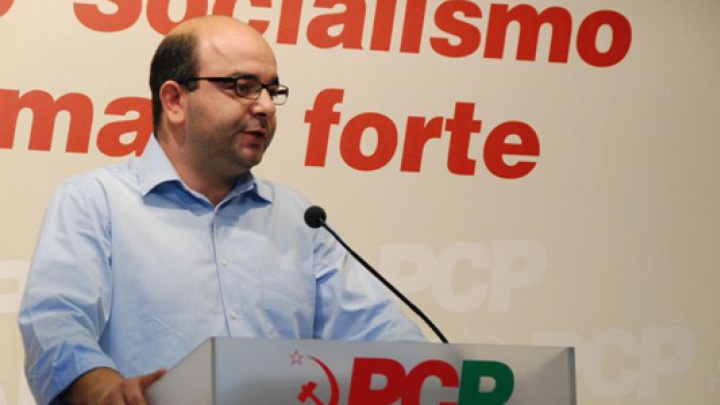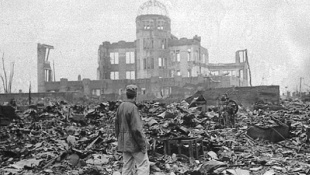Press Conference, Ângelo Alves, of the Political Committee of the CC and of the International Department of PCP
65 years ago the world witnessed one of the most heinous crimes against Humanity. August 6th. and 9th. – the days when Hiroshima and Nagasaki were reduced to ashes after the launching, for the first time in history, of two atomic bombs – are two of the darkest pages of World History which should not and cannot be forgotten.
The bombing of Hiroshima and Nagasaki was not a random act, and much less a necessary military strategy to ensure the victory of the Allies in World War II. The launching of two atomic bombs on civilian populations was a premeditated and criminal decision by North American imperialism aiming a demented affirmation of its military and technological supremacy and the signaling of its policy of increasing confrontation with the former Soviet Union and the beginning of the so-called “cold war”.
The act of remembering the crime of state terrorism carried out by the USA against the martyred populations of Hiroshima and Nagasaki is not, to the PCP, a simple tribute to the victims of the nuclear horror. To the PCP, remembering Hiroshima and Nagasaki is above all to keep alive the memory of the nuclear holocaust – to draw all lessons from it – and to reaffirm the crucial importance of the struggle against militarism, imperialism and war, for peace, disarmament, a peaceful resolution of conflicts and cooperation among peoples. Hiroshima and Nagasaki were a tragic demonstration of how far imperialism can go in the use of militarism and war as part of its strategy of economic and geostrategic domination.
Today, 65 years later, in an international framework marked by the deepening of a structural crisis of capitalism, by a brutal deepening of the exploitation of the workers and the peoples, by serious anti-democratic swerves, by foreign interference and attacks against the sovereignty of the peoples, by growing inter-imperialist rivalries and by complex rearrangement of forces at the international level, reality regretfully shows that militarism, war and aggression continue to be central instruments of imperialist strategy,
The military offensive led by the world’s main powers and by NATO today assumes a global and multifaceted character. Denying the propaganda and easy words of “change”, “dialogue”, “containment” and “diplomacy” which marked Barack Obama’s election and the Nobel Peace Prize awarded to the North American President, the current international situation is marked by the intensification of imperialist wars, namely in Iraq and Afghanistan, by the scandalous increase in military spending – according to the latest available figures, in the bosom of the international economic crisis, military spending increased 6% between 2008 and 2009 and 49% between 2000 and 2009, reaching a record amount of 1,5 billion dollars -, by a consolidation and growth of aggressive political and military blocs like NATO, by an accelerating militarization of blocs such as the European Union and by a dangerous entanglement of strategic and military actions aiming several countries and peoples.
The PCP follows with great concern the several tension points which characterize the current international situation and are inseparable from the policy of interference and militarism by the US and NATO: in the Far East with the recent South Korean and US military maneuvers in the Yellow and Japan Seas and the reiterated affronts against China, like the sale of weapons to Taiwan; in Latin America with the recent provocations against Venezuela, the reactivation of the US Fourth Fleet, the installation of several North American military bases in Colombia and other countries in the region and the de facto military occupations of Haiti and Costa Rica and the coup in Honduras; and, very specially, in the Middle East, with the recent Israeli provocations in the Blue Line between Lebanon and Israel (which led to the death of several Lebanese soldiers and a journalist, member of the Lebanese Communist Party, to whom the PCP pays a heartfelt homage, with the unpunished actions with which Israel continues its policy of state terrorism against the Palestinian people and those who solidarize with them, and also the extremely dangerous escalade against Iran under the excuse of an alleged nuclear danger, ignoring the recent and important steps by diplomacy like the agreement between Iran, Turkey and Brazil on the of exchange of nuclear fuel.
The US and NATO actions and crimes in the whole area of the Middle East and Central Asia, some of which were recently confirmed with the disclosure of North American military documents, represent a very dangerous context in one of the world’s most tense regions, and completely unmask the campaigns of rehabilitation of North America’s and NATO’s image during the past two years. It is not with the widespread killings of civilians and other war crimes, with the continuous support and military aid to many countries in the region, including Israel, with the continuation of the occupation of Iraq and the use of forbidden weapons in this war of aggression, with the intensification of the war in Afghanistan, with the growing threats against Iran and now Pakistan, with the shameless support for the policy of state terrorism and international provocation by Israel, with the conniving silence over the already proven Israeli nuclear arsenal, that one can contribute for peace in the region.
If the USA and NATO were truly interested in a real disarmament policy they would not resort to the artifice of instrumentalizing the Non Proliferation Treaty – whose Review Conference was met by much US propaganda but very limited decisions – to serve its strategy of pressures and interferences in countries of the region like Iran and Syria. If the USA and NATO were truly interested in nuclear disarmament they would not insist – as foreseen from what is known from the central aspects of NATO’s new strategic concept to be approved in the November Lisbon Summit – in maintaining a very powerful nuclear arsenal (with a combined total of 10.000 nuclear heads) that could be used in military attacks, would not insist on positioning North American nuclear weapons in several European countries – in an action that goes completely against one of the three pillars of the NPT – and would not go ahead with decisions, like the recent one taken by the United Kingdom, to sell nuclear technology to India, a non-signatory country of the Non Proliferation Treaty.
If on the part of the USA and NATO there were a real design for nuclear disarmament they would have to start by significantly reducing their own huge nuclear power, would have to put an end to occupations and wars of aggression in one of the most unstable regions of the world, would have to guarantee to the Palestinian people their right to a free and independent motherland and would have to pressure Israel to declare and eliminate its nuclear arsenal, the foremost and essential condition for a desired, and long defended by progressive forces all around the world, Nuclear Weapons Free Zone in the Middle East.
But this is not happening. And it does not happen because the nuclear issue, as Hiroshima and Nagasaki have proved, is not separable from the international situation and imperialism’s root options. Does not happen because, at a time of severe crisis and loss of relative weight by the world’s main capitalist powers, militarism continues to appear as the other side of capitalist economic globalization and NATO confirms itself as the riot police of the world’s main capitalist powers. It does not happen because the USA and NATO instrumentalize international law and use international bodies such as the UN and its Security Council, not to concert positions, achieve consensuses and contribute for international détente, but to impose their interests and strategy.
It is in this extremely complex and dangerous framework for the peoples of the World and for Humanity that the NATO Summit will be held in Portugal. Expected to take place in November this year, it will hold three main objectives: Bind its members to the military quagmire of the war in Afghanistan and to the decision to further increase military spending in this and other wars; approve a new openly aggressive strategic concept, of global intervention by NATO under any excuse, giving it a broad choice of missions and goals which point to its superimposition even in relation to the UN, thus raising this political and military bloc to a new level as an instrument of interference and aggression at the global level; and finally to involve NATO members in the project of installing antimissile systems in Europe, a decision if materialized would represent the end of the still existing strategic nuclear balance between the world’s two main nuclear powers.
It is in this framework and considering the danger that the objectives of NATO’s Summit represent to all the peoples of world, that the PCP is strongly committed to creating, during this summit in Portugal, a strong popular movement of struggle for peace and against NATO’s militarist and aggressive policy. A policy which regretfully, and in an action contrary to the sign of the Constitution of the Portuguese Republic, the Portuguese government supports, as witnessed by the decision to host yet another war summit in our country.
65 years after Hiroshima and Nagasaki, the PCP appeals to all peace lovers, the workers, the democrats, the youth and the Portuguese people in general, to mobilize around the Campaign “Yes to Peace, No to NATO” which gathers more 100 organizations and to raise their voices against this conclave of militarism and war, in defense of peace, disarmament, cooperation and friendship among peoples. It is the struggle of the peoples that will better ensure the success of the well-known sentence “this will never happen again”.

